#stream of consciousness post
Text
So I was listening to the Back To The Future: The Musical cast recording. And. Well

I think it speaks for itself
#jedidiah martin#chnt jedidiah#chntkin#thats actually really funny to me#stream of consciousness post
16 notes
·
View notes
Text
Just finished the podcast and omg I love Nathan so much. I love how real he is and how passionate he is about TV and representation. I also love how open he is with himself like talking about what he finds hot and stuff lmao it just brings me joy.
It does sound like ofmd has reignited his love for acting somewhat and I'm just so happy for him. Like this is the young queer millennial success story we deserve.
5 notes
·
View notes
Text
why was bashir a closeted homosexual in the 23rd century? like dude it's fine you can relax. actually wait the tense here is kinda funny. i used past tense because ds9 is from the 90s and i watched it in 2021 so in both cases it's from the past in my view. but when talking about a text you speak in the present: why IS bashir a closeted homosexual in the 23rd century? but the statement is half about how ds9 takes place in the scifi future: why WILL bashir be a closeted homosexual in the 23rd century?
#chirps#ds9#this post breached containment. i am so sorry if my personal hc of a character who has no canonical queer identity disagrees with yours.#however this is my post. that is my personal headcanon then followed by my stream of consciousness.#it's okay. you can make your own post.
5K notes
·
View notes
Text

revstar emu save me
#please watch revue starlight#project sekai#pjsk#prsk#emu otori#proseka#Im so mad i wrote 8 million tags stream of consciousness style and then aposted this to the weong account#im not rewriting all that. you get NOTHING.#actually i will say again i have no idea why this kind of blee up on twit please WATCH TEVUE STAKRIGHTBTNGL#i KNOW 4 thiusand of you did not watch it Watch revue starlight Do not speak of yuri unless you partske in the revue#sorry. anyways#the jist of it was ahh the assignments -> making cosplay -> might post it here if i can take a bice photo for once in my life#because im proud of it. as mortifying as it is.#my best friend is cosplaying an im the clown Two lesbians walk into the metro convention centre(is that where toronto comicon is????)#Oh right i was thinking of making little drswings of pjsk charas or at least exs and printing them out in bulk on a dheet of paper#and coloring them in w markers and giving them to people at the pjsk meetup or vendors i get merch from..#i thought itd be fun. Also i swear to god i have a sheet of like MAGNET paper somewhere i want to make people emu magnets#Ok i fucking for real have to go to sleep i have to get up for class in 5 hours. wuit your college join my emo(daily affirmations)
706 notes
·
View notes
Text
Isaac speaking like three words at a time and just in a book 90% of the time, but then in Paris it pans over to him paired with Harry and he’s just going off on him is SO funny. Get his ass lmao
#heartstopper#heartstopper spoilers#heartstopper season 2#again I apologize to anyone following me who don't care about Heartstopper lol#I'm tagged all the posts as such so if you block the tag it'll save you from my current stream of consciousness#lee speaks
880 notes
·
View notes
Text
A lot of cis people may not want to hear this, but here goes:
You are going to have more in common with trans people who have a similar gender identity to you than you think. Trans people are reliable narrators of their own experiences, and whether you like it or not, we will have similar or even identical experiences to yours. Cis people don't have a monopoly over their gender or the experiences people have as a result of their gender.
#trans#transgender#lgbt#lgbtq#ftm#mtf#nonbinary#ally advice#like in my experience i have had way more in common with cis men than cis women#and of course it is always more complicated than what a tumblr post can provide. but by and large i have noticed this trend#cis people like to pretend that trans people are a seperate species to them when that can't be further from the truth#cis people don't like to think that their bodies/experiences/lives could be in any way shape or form similar to a trans person's#but they're wrong in that case. there are so many of us with baried experiences. because we are PEOPLE#i feel like i am screaming my personhood into the void sometimes so i hope maybe this reaches somebody#as horrifying as it is (/s) i am as much a person as i am a man#and as horrifying as it is (/s) other trans people are as much their genders as they are PEOPLE#enjoy me posting my stream of consciousness then going back to play skyrim and fo:nv until i pass out or whatever i feel like lol<3
2K notes
·
View notes
Text
Re: shb trolley problem I find it kinda funny and hypocritical that so little care/sympathy is being shown towards the 8th Calamity Timeline and how underexplored that problem's in canon, it's ""okay"" to erase that timeline, along with Exarch himself (as per the 5.0 knowledge), just because a portion of that doomed Source's population (the Ironworks and others who worked on the plan) said it's okay, we hate it here anyway. Surely the rest of the star unanimously agreed with that.
#just random stream of consciousness i haven't slept well in weeks#feel free to add your thoughts#text post
159 notes
·
View notes
Text
ok so. miki’s sunlit garden is the literal sunlit garden where he and kozue played piano together as children. it’s the defining version of this narrative device, and in a way, it’s the most straightforward. miki is leaving the garden and entering the world of teenagers. he is scared of growing up, and he misses the effortless, uncomplicated bond he shared with his sister when they were children, before being inculcated into a world of sexual power and abuse, before his parents divorced and his beautiful nuclear family was rent asunder by real-world complications. i genuinely think every 13-ish year old goes through this grief and a desire to hold onto the past, to remain in this perfect nostalgic bubble through which you view your childhood. it’s probably the most universal and identifiable instance of the motif of the sunlit garden.
then it gets more complicated. nanami’s sunlit garden is her memories of short-haired touga, of her big brother showing her his affection, making her feel special, worthy, and loved. but unlike miki, she doesn’t miss being a part of the ideal nuclear family. for one thing, both she and touga are adopted. of course, she doesn’t actually know that, but it nonetheless problematizes the bioessentialist logic upon which the nuclear family [abuse factory] structure is predicated. secondly, it’s clear that she was always the scapegoat to touga’s golden child. which is why it’s not that she loves her sibling as an extension of her childhood nostalgia, but that her entire value system fundamentally revolves around touga, because he was the only person in her formative years who ever showed her the slightest sliver of affection. and in all her memories of him, he has short hair (like dios, like miki), because subconsciously she doesn’t even want him to be her Prince, her patriarchal savior, she wanted him to be someone who loved her because she inherently deserves love. she does treat him like her prince in the present, but that’s only because it’s how her love for him must take form in ohtori. deep down, she doesn’t want a prince, a lover, or even a brother; she wants a friend who will love her for nothing. but she has no way of expressing that, not in a world that claims true friendship is for fools. so instead she values him for their biological ties, for his status as a kiryuu, for his patriarchal role as the eldest son in their perfect nuclear family. and she refuses to acknowledge how she demeans herself in the process of worshipping him, how she’ll drown herself and cook herself and cage herself, debase herself and dehumanize herself for his illusory love. and that is what the sunlit garden means to nanami.
as for saionji, the sunlit garden also constitutes his memories with touga, of a “before” that is much more definable in the sense that there is clearly a moment where it becomes “after.” one day they are riding their bike through the rain after kendo practice, and they decide to take shelter in a church. and saionji sees touga become someone he fears and also envies. someone who wields the power to project something eternal, to inspire, to save. and he exerts his power in a subtly violent way, by transgressing invisible boundaries. saionji cannot harness that power, so he attempts to exert it clumsily, through immediate, obvious, physical forms of violence. it never quite packs the same punch as touga’s manipulation, no matter how hard he tries. but what saionji really longs for is not to possess touga’s power, but to go back to the way things were before touga decided he wanted power. touga thinks true friendship is for fools, but like nanami, all saionji wants is to be touga’s true friend. and isn’t that just tragic?
of course, that’s not all saionji wants. but his desire is complicated by the fact that he clearly also resents the sexual acts he is being put through by touga, even if in other circumstances, it could be what he wanted. juri’s situation, her sunlit garden, is similar to saionji’s in this respect. all she wants is shiori, but she doesn’t want the shiori she is being presented with. she wants the shiori from an illusory idealized past in which they were true friends, before shiori betrayed her and revealed her ugly feelings in the process. like miki with kozue, nanami and saionji with touga, utena and anthy with dios, mikage with mamiya, juri is idealizing a version of the object of her affection who never really existed. shiori’s ugly feelings were always latent. unlike miki’s sunlit garden, nanami’s flashback to touga’s party and sea of photographs, or saionji’s memories of touga tenderly wrapping his hand, juri does not even have memories of shiori that are not defined by her betrayal. yes she has shiori reaching out, holding a rose, saying “believe in miracles and they will know your heart,” but it’s an obvious fiction. juri doesn’t know shiori at all, and the shiori juri knows is not the shiori she loves. the sunlit garden is always a garden of illusion.
utena’s sunlit garden, which opens many episodes, is perhaps the most obvious example of this fact. she completely rewrote her own formative memory to better suit the dominant patriarchal narratives she was forced to adopt all her life. and you can say that akio actively tampered with her memories, but functionally speaking, that’s the same thing. even more so than the others, her sunlit garden is a palimpsest; she idealizes a past and a prince that never actually existed. sure akio and anthy exist, but her “prince” is not either of them. the locus of her will to live, that eternal thing, is a fiction. but her desire to help others in need is genuine. and that is what differentiates utena’s sunlit garden first and foremost. it is not founded on a selfish desire to cling to a perfect past of illusion, but on the selfless desire to keep moving forward in hopes of a better future. they all want to hold onto something eternal, including utena in her desire to keep her parents with her, and all of those desires are perfectly understandable and eminently sympathetic, but utena is different because that day that akio showed her anthy’s suffering, utena’s desire shifted from a memory to a telos.
mikage’s sunlit garden thus becomes a cautionary tale to all the members of the student council who wish to live in a memory, perfectly suspended, pinned in place like a butterfly on display. just as a caterpillar must become a butterfly, a child must enter the world of adults. mamiya is beautiful because he has the luxury of dying young, of being immortalized on a carousel, of never losing his innocence. mikage is what happens to people who idealize eternity through escaping into nostalgia. the world keeps moving on without them, and they become ghosts, trapped in a past that no one can recall.
so what of akio? he uses people’s sunlit gardens against them, he manipulates time and memory, feeds off nostalgia and the grief of lost childhood. he cultivates his garden to resemble golden days, and as he invites you through his gates, ensnares you. so what does that mean, when his goal, too, is to achieve eternity? above all he wants to forge a sword that will break through the closed gates and reinstate his former glory. of anyone in ohtori, he is the one most deeply entrenched in his oh so cozy coffin. for all that he knows his promises to be illusory, he also clings to that logic, he also mourns dios. he longs for his golden days despite knowing that they’re untenable, despite being well aware of the toll it took on anthy. and even fully aware of the extent of his exploitation, of the fundamental illusion of eternity, he still attempts to attain it, he still instantiates himself in a cycle on the carousel, condemned to ghosthood, a butterfly pinned in place.
finally, we must look to the absent figure, the outlier. what, or rather who, is touga’s sunlit garden? the movie tells us it is utena, that he embodied the princely role in the truest sense and that this is his deepest aspiration. but i don’t know if that’s necessarily how i read him. anthy and touga are foils, two sides of the same coin. anthy doesn’t have a “sunlit garden” per se, because she has long given up on the idea of returning to a time when she loved dios, before the swords of hatred pierced her heart. but she has a literal sunlit garden, and her role is to tend the flowers in it and never leave. she has a literal coffin, guarded carefully in the chambers of her heart. anthy knows better than to cling to an idealized past, but still, she cannot find a way to move forward. so she gets stuck in a circular present, where both past and future are illusory concepts. it is not enough to simply know that the past is gone, one must also strive for a better future. it is why utena and anthy’s promise to drink tea and laugh together in ten years is just so powerful within ohtori’s timeless walls. i’d bet anything that touga also doesn’t have an idealized past. if, again, we use the movie to inform our understanding of him, he was always aware of the abuse that pervaded his world, he was never an innocent. but instead of desiring reform, like utena, of wanting to save those suffering, he wants to be the one inflicting that suffering as much as possible. to cope, he accepts his abuse as a necessary consequence of existence, and assumes that anyone capable of abusing him is simply more powerful, and thus deserves to exert their power over him, just as he deserves to exert his power over those less powerful than he is. so like anthy, he doesn’t have a sunlit garden, but he has a coffin, and a garden, and a carousel. and like anthy, he must choose for himself whether he wishes to remain a complicit victim, or to leave his cozy coffin and find a way to move forward. and that, only time can tell.
#analysis#manalysis#u#UMM. THIS POST WAS SUPPOSED TO BE ONE PARAGRAPH????? OOPS#it’s 2 am now. fuck#the sunlit garden#miki#nanami#touga#saionji#utena#anthy#akio#mikage#juri#shiori#mamiya#dios#this was just me rambling as a way to organize my thoughts#it’s incredibly stream of consciousness#i am in no way trying to make an argument here im just trying to like. parse my thoughts on the sunlit garden#(the land of illusion….. anyone else hongloumeng pilled.?)#long post
319 notes
·
View notes
Text
dennis system for men "why? how come?" "shhhh" "bathrooms at zoos are like hotspots for closeted dads" "you guys grindin?" suppress your instincts "because I AM him" DONT YOU SEE ITS ALL COMING TOGETHER
#this is my stream of consciousness i cant fucking move rn#iasip#its always sunny#its always sunny in philadelphia#dennis reynolds#mac mcdonald#macdennis#text post#mine
887 notes
·
View notes
Text
Me whenever Rhythmic Clock from Clock Ticking Sounds for Deep Sleep comes on

8 notes
·
View notes
Text

How many times have we done this, Interceptor?
You betrayed me at one point.
composition
#pokemon rejuvenation#melia#emma#did i take a screencap of the entire altar incident and pause it frame by frame to transcribe the backwards text?#no#maybe#perhaps#no fr tho i love all of the small touches in 13.5#the replay value is phenomenal#i know i'm not the only one who finds paragon melia off#who even is melia anyway#melanie + maria?#what about emma?#only upon drawing this did I realize how nearly identical Melia's Archetype winx club fit and the Emma “disguise” are#working on a theory about that whole disguise situation and might post something soon#in an actual post tho bc it's probably bad to be abusing tags like this#but the stream of consciousness format is so fun#anyway i had a lot of fun making this. trying to make art for fun and for me again. 2024.#linked the composition inspo in the post body! super dope great study
188 notes
·
View notes
Text
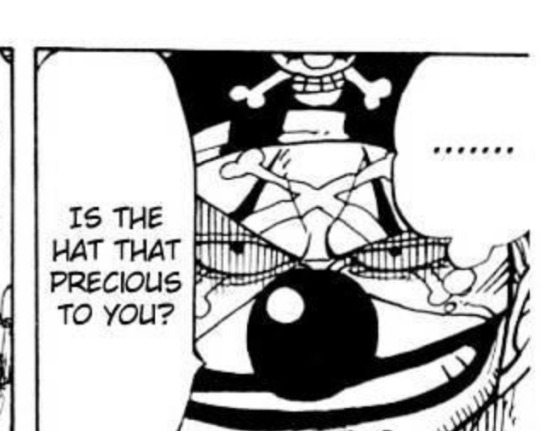

Looking back at these panels, it does seem like Buggy was venting his feelings about Shanks by yelling at Luffy -- even if he didn't realize it in the moment. Although the straw hat has its own meaning to Luffy, to Buggy, it was always a symbol of Shanks' potential.
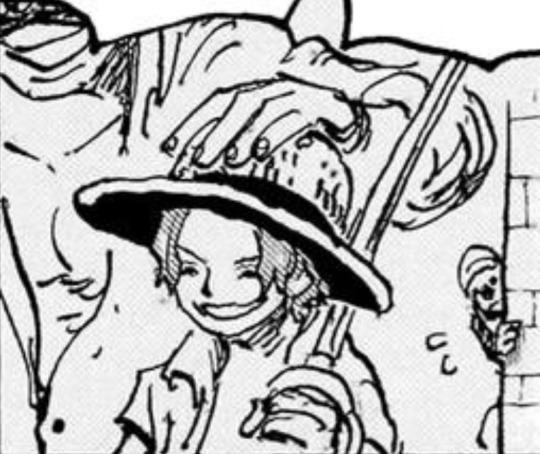
Even though the straw hat was Roger's first, Buggy associates it with Shanks more than anyone else. When he reflects on Shanks' promise, we see Roger's hand on Shanks' head/hat (a move Shanks mimics when he recognizes Luffy's potential for greatness, too). But Roger isn't even fully in frame.
Buggy definitely cared about Roger's legacy, but he also believed Shanks would surpass that legacy in order to become the next generation's "king." The hat -- the crown -- was always Shanks' to wear. No one else's. (Certainly not his. He never believed in himself.)
So, once Luffy calls the straw hat his treasure, Buggy fixates on it as a target. That idea clearly pisses him off -- irrationally so. Based on what we know about Buggy, giving is not something he does; if he considers something treasure, he hoards it aggressively. He'd even go as far as to kill someone over it. Unlike Shanks, he would never give something up and then dare to call it a precious "treasure."
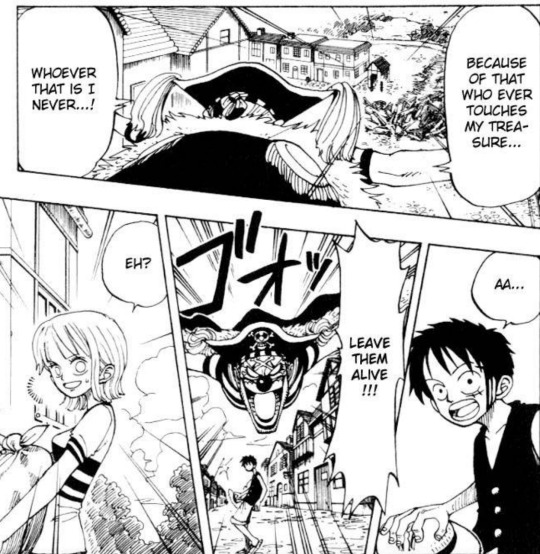
I think Buggy believes that Shanks would have kept the straw hat if he truly treasured it. Protected it with his life. He would have fought instead of falling back, and gone to Laughtale as soon as he could. He would have lived up to his potential. But he did none of that. So, in the end, the straw hat is worth as much as his word: nothing at all.
If Buggy truly associated the straw hat with Roger, I don't think he would have spit on it or damaged it the way he does in this chapter. He clearly still holds his former captain in high regard, after all. But when it comes to Shanks, Buggy lets his anger, hurt, and disappointment get the best of him.

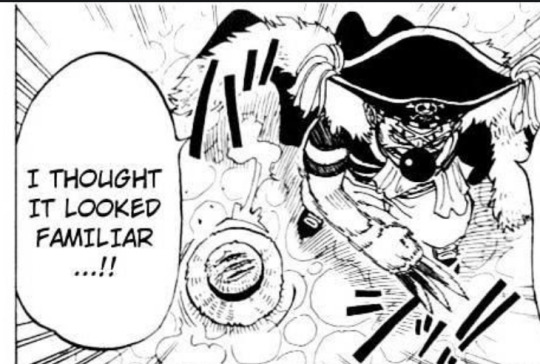
I'm definitely reading a little too much into this scene, but it really sticks with me; Buggy's violent outburst speaks volumes about his subconscious. And because Luffy can be so similar to Shanks at times, I think it's easier to project his repressed feelings onto Luffy.
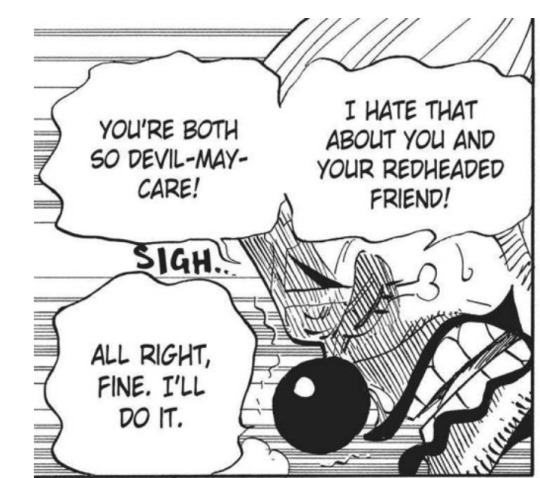
#one piece meta#well this is more a stream of my consciousness as opposed to meta but#shuggy#yeah i guess this qualifies as shuggy#buggy the clown#one piece#shanks#red haired shanks#buggy#akagami no shanks#long post#op meta#meta
135 notes
·
View notes
Text
Hey, can we take a moment to acknowledge it’s really fucked up how normalized ableism and eugenics were even before the pandemic? Yes, covid kills and disables way more people than the flu, and eugenics is even worse now, but the fact that we were just happily infecting each other with other illnesses pre-pandemic even though people died from them every year? That was a choice our society (and governments) made. We could’ve been masking and staying home when sick and doing way more to protect the vulnerable, and instead, we just… didn’t. It was just normal to go to school and work sick, and it was normal for tens of thousands of people to die from the flu every year. That’s horrible. Why were we doing that? I know the answer is probably capitalism, but that doesn’t make it better. How did we let our society get so bad that over 50,000 people (US statistic) dying of the flu (not even all preventable contagious illnesses) in a year wasn’t even a blip on the radar?
#it was never ok for the vulnerable to die from illnesses we could’ve protected them from#and I hate that it took me becoming part of the vulnerable to fully realize that#ableism#eugenics#covid#covid 19#pandemic#long covid#disability justice#disabled#disability#my post#original post#sorry it’s a little stream-of-consciousness lol
137 notes
·
View notes
Text
been thinking about dad trying to finger me the day after fucking me really hard. thinking about telling him he was too rough and it hurts too much to do it again. thinking about his fingers moving down to my ass instead. thinking about getting scared bc his cock is too big and wont fit there. thinking about begging him to use my mouth instead and him responding with, "but baby, daddy doesnt want just ur mouth tonight" and pushing his fingers inside. thinking about him stretching me until im sobbing and screaming and praying that he'll just cum so it'll all be over and the pain will stop. thinking about him having a plug thats way too big ready for me as a surprise, so that even when he's done, the pain doesnt stop
103 notes
·
View notes
Text
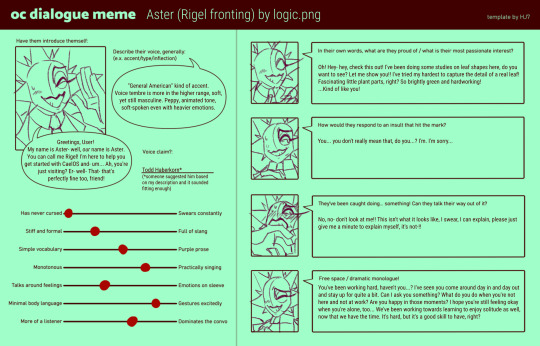
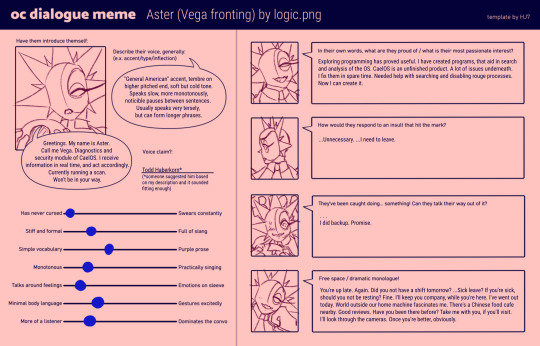
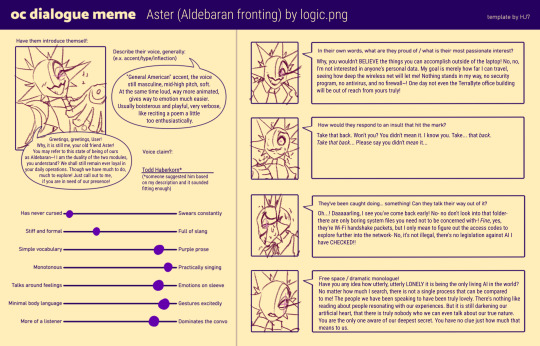
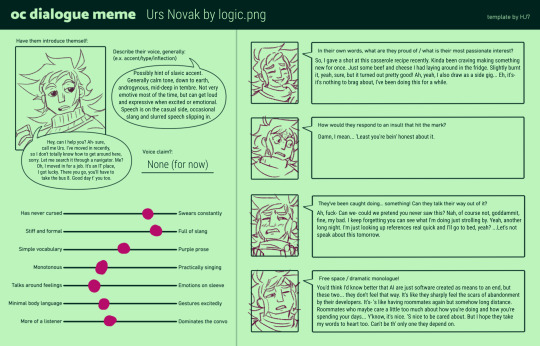
it's been taking me forever to finish these to even this state and then Suddenly i just sketched the expressions and cleaned them up all in one evening
anyway hi i saw a meme and thought it would be good to give a writing test drive to my boys again (urs especially...)
[ original blanks here, image transcriptions in ALT text ]
#oc meme#artist meme#ai oc#robot oc#original character#artists on tumblr#oc#aster#rigel (aster)#vega (aster)#aldebaran (aster)#urs novak#CaelOS#original#i didn't know what to make up for the free space it's really just. stream of consciousness rather than monologue even#anyways i may have gotten myself of the art pit? what was it a month?? two months??#not totally back obviously but#doodle post#this is made in krita btw. did you know that krita is a nightmare to add text with??#well not made but edited but yknow
126 notes
·
View notes
Text
Why is Jax so upset at the end of Episode 2?
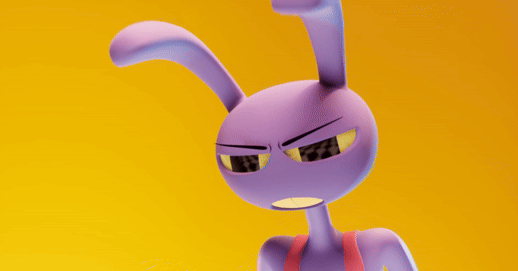
He’s disappointed for the lack of violence, sure, but in the end he looks truly down. I wonder if he feels disconnected from the group? He was the only one not present at Kaufmo’s funeral and he doesn’t seem to really value anyone else in the cast - he moreso just uses them for his own entertainment and ends. While this is at least partially his own fault for being such an asshole man-baby, it can’t help with the feeling of isolation and rejection, feeling like he’s the only one worth his salt on the team, and that he has nobody to relate to or connect with, even in a situation where it’s natural to grow closer as a result of shared traumatic experience and living quarters. Essentially - he might feel like he’s the only one truly alone while everyone else seems to become dearer to each other, even if that feeling is because he views himself as superior.
His lack of ability to connect could also be because he feels like he doesn’t deserve it, of course. He clearly has issues with his ego; this could be because he thinks so highly of himself that the real him can’t compare, causing him to defend his status as “better than the rest” in order to protect himself from recognizing the difference between his perceived status and the reality of who he is. This could also be because he’s self aware that he’s an asshole and doesn’t know how to change or cope more healthily, so he just pushes everyone away and continues hurting them instead of improving. In the first case, he seems to struggle with some real narcissistic traits and clearly needs help - he also needs help in the second case, but it seems like his behaviors there stem less from blatantly narcissistic beliefs and more from his response to the trauma of the circus. Both cases could exist within the same character as well, even if only at different times.
Either way, he clearly needs a lot of support, a better outlet for his feelings, and some sort of reality check that actually gets through to him. He’s very young still, only being in his early 20s, so I think it’s a real possibility that his more cruel behaviors stem from lack of experience and knowledge about other people/social relations rather than from pure malice. We also don’t know how long he’s been trapped in the circus - if he already had some of these ego problems before he entered, it can’t have helped his mentality. I hope he realizes he needs to change and improve himself to improve his life and that he gets the support he needs throughout the show! I can’t wait to see more of him and his character development.
Anyways, I loved episode 2 and I want to see Zooble’s figurine collection
#Ted talk#amazing digital circus#tadc#tadc jax#Jax#character analysis#this is more or less just a stream of consciousness so idk if I should tag this as an analysis or not#it technically is - even if it’s not well done - so I suppose I’ll tag it as such loll#the amazing digital circus#also if you read through all of this I love you forever and I hope you enjoyed!!#I’d be overjoyed for someone to tell me what they think - either about my analysis or his character in general#my posts#my writing#tadc episode 2
73 notes
·
View notes